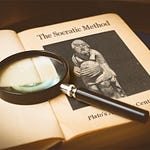In this podcast, Donald describes a simple method for learning, or teaching, the Socratic Method, originally used by Socrates, with lots of examples.
How the two-column technique is used in cognitive therapy today
The original two-column method used by Socrates
What Socrates actually said, excerpt from Xenophon’s Memorabilia Socratis
Example of similar technique used centuries later by a Stoic teacher
Epictetus seems to describe Socrates doing written exercises in a private notebook
Here’s the link to the original article, which contains a detailed description of a modified version of this exercise, for use in modern-day workshops.














